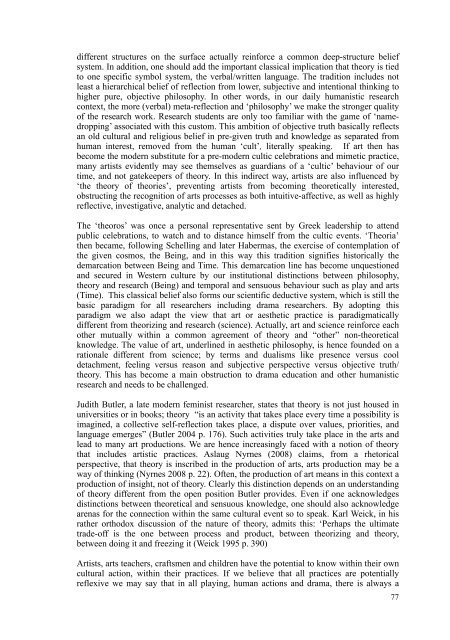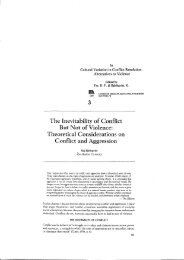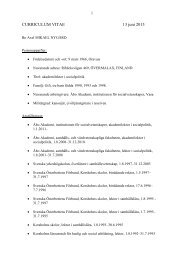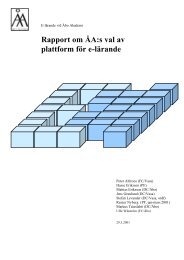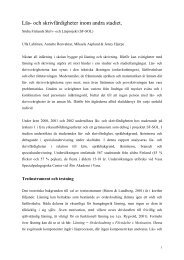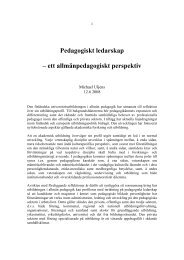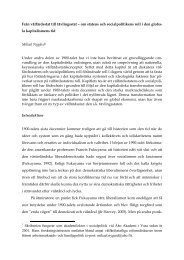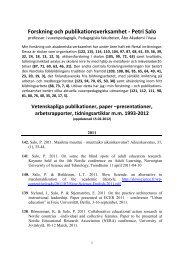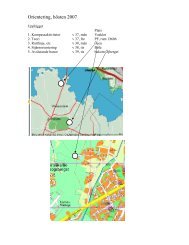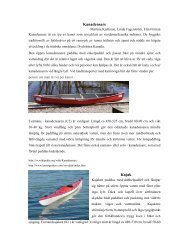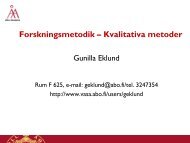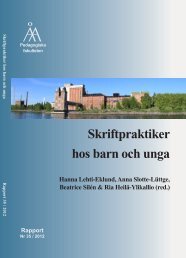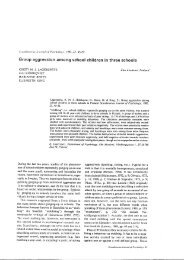Drama Boreale - Åbo Akademi
Drama Boreale - Åbo Akademi
Drama Boreale - Åbo Akademi
Create successful ePaper yourself
Turn your PDF publications into a flip-book with our unique Google optimized e-Paper software.
different structures on the surface actually reinforce a common deep-structure belief<br />
system. In addition, one should add the important classical implication that theory is tied<br />
to one specific symbol system, the verbal/written language. The tradition includes not<br />
least a hierarchical belief of reflection from lower, subjective and intentional thinking to<br />
higher pure, objective philosophy. In other words, in our daily humanistic research<br />
context, the more (verbal) meta-reflection and ‘philosophy’ we make the stronger quality<br />
of the research work. Research students are only too familiar with the game of ‘namedropping’<br />
associated with this custom. This ambition of objective truth basically reflects<br />
an old cultural and religious belief in pre-given truth and knowledge as separated from<br />
human interest, removed from the human ‘cult’, literally speaking. If art then has<br />
become the modern substitute for a pre-modern cultic celebrations and mimetic practice,<br />
many artists evidently may see themselves as guardians of a ‘cultic’ behaviour of our<br />
time, and not gatekeepers of theory. In this indirect way, artists are also influenced by<br />
‘the theory of theories’, preventing artists from becoming theoretically interested,<br />
obstructing the recognition of arts processes as both intuitive-affective, as well as highly<br />
reflective, investigative, analytic and detached.<br />
The ‘theoros’ was once a personal representative sent by Greek leadership to attend<br />
public celebrations, to watch and to distance himself from the cultic events. ‘Theoria’<br />
then became, following Schelling and later Habermas, the exercise of contemplation of<br />
the given cosmos, the Being, and in this way this tradition signifies historically the<br />
demarcation between Being and Time. This demarcation line has become unquestioned<br />
and secured in Western culture by our institutional distinctions between philosophy,<br />
theory and research (Being) and temporal and sensuous behaviour such as play and arts<br />
(Time). This classical belief also forms our scientific deductive system, which is still the<br />
basic paradigm for all researchers including drama researchers. By adopting this<br />
paradigm we also adapt the view that art or aesthetic practice is paradigmatically<br />
different from theorizing and research (science). Actually, art and science reinforce each<br />
other mutually within a common agreement of theory and “other” non-theoretical<br />
knowledge. The value of art, underlined in aesthetic philosophy, is hence founded on a<br />
rationale different from science; by terms and dualisms like presence versus cool<br />
detachment, feeling versus reason and subjective perspective versus objective truth/<br />
theory. This has become a main obstruction to drama education and other humanistic<br />
research and needs to be challenged.<br />
Judith Butler, a late modern feminist researcher, states that theory is not just housed in<br />
universities or in books; theory “is an activity that takes place every time a possibility is<br />
imagined, a collective self-reflection takes place, a dispute over values, priorities, and<br />
language emerges” (Butler 2004 p. 176). Such activities truly take place in the arts and<br />
lead to many art productions. We are hence increasingly faced with a notion of theory<br />
that includes artistic practices. Aslaug Nyrnes (2008) claims, from a rhetorical<br />
perspective, that theory is inscribed in the production of arts, arts production may be a<br />
way of thinking (Nyrnes 2008 p. 22). Often, the production of art means in this context a<br />
production of insight, not of theory. Clearly this distinction depends on an understanding<br />
of theory different from the open position Butler provides. Even if one acknowledges<br />
distinctions between theoretical and sensuous knowledge, one should also acknowledge<br />
arenas for the connection within the same cultural event so to speak. Karl Weick, in his<br />
rather orthodox discussion of the nature of theory, admits this: ‘Perhaps the ultimate<br />
trade-off is the one between process and product, between theorizing and theory,<br />
between doing it and freezing it (Weick 1995 p. 390)<br />
Artists, arts teachers, craftsmen and children have the potential to know within their own<br />
cultural action, within their practices. If we believe that all practices are potentially<br />
reflexive we may say that in all playing, human actions and drama, there is always a<br />
77


